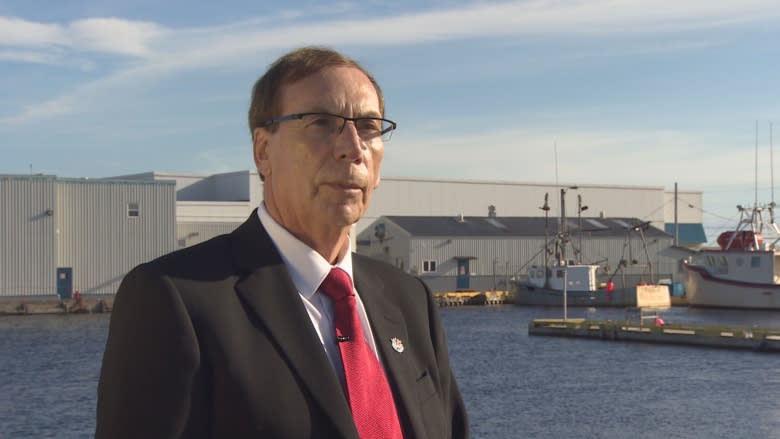'We were blindsided': Grand Bank mayor anticipating job losses in wake of major arctic surf clam changes
Full-time, year-round work — it's hard to find in fish processing in Newfoundland and Labrador.
A recent decision by Fisheries and Oceans Canada to shift some of the arctic surf clam quota away from Clearwater Seafoods could make it even harder.
"Either we're going to lose a number of full-time workers and middle class jobs, or we're going to be on a part-time basis," said Rex Matthews, mayor of Grand Bank, where Clearwater does most of its arctic surf clam processing.
"We were blindsided."
Clearwater Seafoods is the world's biggest supplier of arctic surf clams, and they hold all three of the surf clam quotas. They fish the clams with large offshore vessels in the Grand Banks and then process and ship them to Asia, where their bright red flesh is used in sushi and sashimi.
Most of that processing is done at the plant in Grand Bank.
"It's probably one of the only fish processing plants in Canada that's operating 12 months a year," Matthews said
"[Operating with] two shifts, full time, mostly six days a week — with reasonable wages and benefits."
But as of a September decision by DFO, Clearwater's arctic surf clam monopoly is over.
As part of the federal government's reconciliation efforts, DFO is setting aside 25 per cent of 2018's quota for a yet-to-be-determined Indigenous-led operation. They put out a call for expressions of interest in September, looking for applications from Indigenous-owned entities based in Quebec or the Atlantic provinces.
It translates as a 25 per cent cut to Clearwater's quota. Matthews is worried it will also translate as a cut to jobs and hours at the Grand Banks plant.
"We all understand the struggles right across this country and the challenge of the Indigenous people. We understand it and we respect it," Matthews said.
But the decision, he said, could affect people in Grand Banks and beyond.
"It's a regional plant," said Matthews, stressing that workers come from all over the area.
"It's going to impact every community and the whole economy on the Burin Peninsula."
Broadening access
Doug Wentzel, DFO's regional director general, said that while the decision comes in line with the federal government's efforts toward reconciliation, it also breaks a long-held monopoly and gives Indigenous people access to a different part of the fishery.
"I think it's important to clarify that this decision has been made to broaden access to this fishery where there has been one licence holder for a number of years. And through that decision the department is looking to introduce Indigenous participation in the offshore," he said.
He also thinks Matthews' job loss predictions are premature.
Companies are used to dealing with ups and down in quotas and catches, he said.
"Any decision around the processing and management of the product is something that will happen by the licence holder," he said.
"So I think it's too early to comment on whether or not we would actually see those impacts in any individual community."
He also stressed that DFO doesn't yet know who will wind up with that 25 per cent of the quota; expressions of interest aren't due until early November.
"We don't know what the outcome will be for communities in Newfoundland and Labrador because we don't know who the successful applicant will be," he said.
Sought-after quota
So far, Nova Scotia's Mi'kmaq communities have said they are working together and will be submitting an expression of interest.
Though this will be the first time the entire quota won't be in Clearwater's hands, it's not the first time someone other than Clearwater has asked for it. Louisbourg Seafoods, from Louisbourg, N.S., has been trying to get a piece of that quota for a decade.
"We've been fighting for 10 years to break the monopoly," Louisbourg Seafoods vice-president Dannie Hansen told CBC Nova Scotia.
"That's why we are so very happy about this decision. The monopoly will be broken. Now we hope that whoever the First Nations partner with, it won't be Clearwater."
But over in Grand Bank, Matthews is seeing little reason to celebrate or hold out for good news.
"Are they going to take other quotas in Newfoundland and Labrador? Are they going to look at other industries like farming or timber rights or mineral rights?" he said.
"Newfoundland and Labrador, we always seem to get a very raw deal when it comes to decisions by the federal government."






